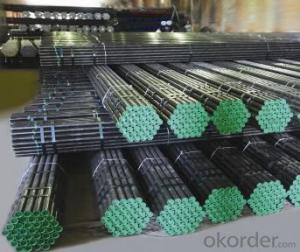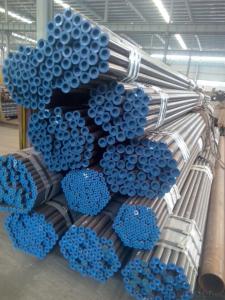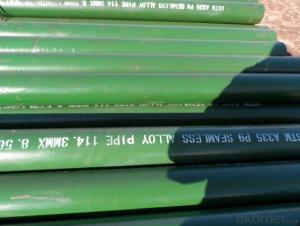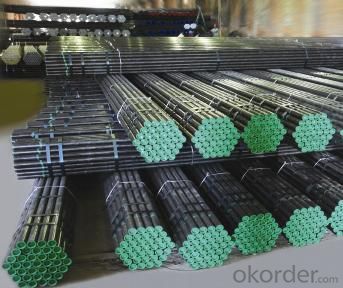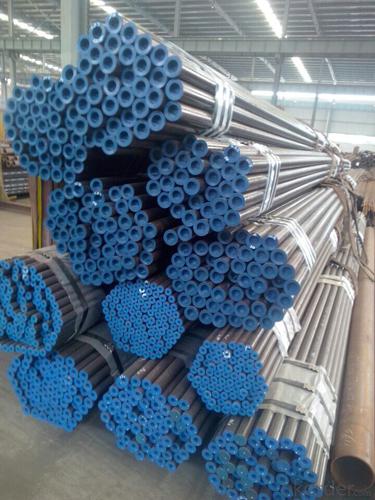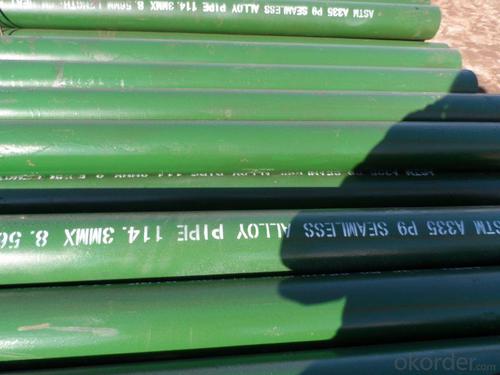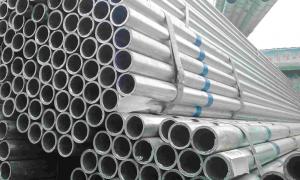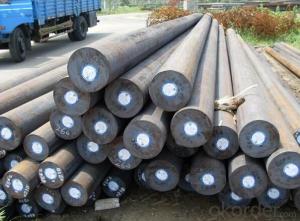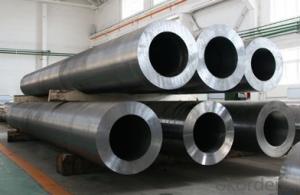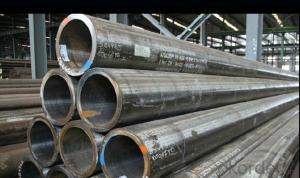Steel pipe A335P9 18-267
- Loading Port:
- China Main Port
- Payment Terms:
- TT OR LC
- Min Order Qty:
- -
- Supply Capability:
- 200T m.t./month
OKorder Service Pledge
OKorder Financial Service
You Might Also Like
A335P9 Steel pipe The standing stock of specifications
A335P9 Steel pipe 70*4.5-5-6-7-8-9-10-12-15-16
A335P9 Steel pipe 245*8-10-14-17-20 -22-30-40
P5 C≤0.15 Mn 0.3-0.6 P ≤0.25 S≤0.25
Si 0.25-1.0 Cr 8-10 Mo 0.9-1.1
Alloy pipe is a steel pipe according to the production materials (i.e. material) to define, just as its name implies is made of alloy steel seamless pipe; and is in accordance with the production process (seamed seamless) to define, seamed pipe seamless pipe is different from, including straight seam welded pipe and spiral tube.
Manufacturing process
1 hot-rolled (extrusion seamless pipe): billet, heating, perforation, three roll cross rolling, rolling or extrusion, tube off, sizing pipe (or reducing), cooling, straightening, water pressure test (or testing), marking, storage
2 cold drawing (rolling) seamless steel pipe: billet, heating, perforation, heading, annealing, pickling, oiling round tube (copper) and multi pass drawing (Leng Zha), the blank pipe, heat treatment, straightening, water pressure test (testing), marking, storage
[(diameter - thickness) * wall thickness of]*0.02466=kg/ meters (per metre weight)
Alloy pipe use
Alloy pipe for low and medium pressure boiler (work pressure is generally not more than 5.88Mpa, the operating temperature at 450 DEG C) of the heating surface tube; used for high pressure boiler (work pressure is generally above 9.8Mpa, operate at a temperature of 450 DEG to 650 DEG C between) the heating surface tubes, economizer, superheater, reheater, petrochemical industry uses the tube and so on.
- Q: How are steel pipes inspected for compliance with industry standards?
- Steel pipes are inspected for compliance with industry standards through various methods such as visual examination, non-destructive testing techniques like ultrasonic testing, magnetic particle inspection, and radiography. These inspections help ensure that the pipes meet required specifications and quality standards, ensuring their integrity and safety for use in various industries.
- Q: What are the lengths of scaffold steel tubes?
- Scaffold tubes are our name for materials used to build scaffolding, because most scaffolding uses tubular bamboo or steel tubing. Bamboo and other bamboo is for a long time in the use of the scaffolding tube, but due to lack of safety and durability, now only in rural and urban area construction is lagging behind some of the home building small building has been used. The modernization construction, the most commonly used type of scaffolding pipe is steel pipe, the scaffolding should not only meet the demand of workers, but also to meet the characteristics of scaffolding firm and durable, so tough hard steel is the best choice. The selected steel pipe generally requires smooth surface, no cracks, no bending, no rust, and meet the relevant national standards.
- Q: What is the difference between steel pipe and copper pipe?
- The main difference between steel pipe and copper pipe lies in their composition and properties. Steel pipe is typically made from carbon steel, which is an alloy of iron and carbon. On the other hand, copper pipe is made from copper, a naturally occurring metal. One key difference is their durability. Steel pipe is known for its strength and resilience, making it suitable for high-pressure applications and harsh environments. It is highly resistant to corrosion, making it a long-lasting option. Copper pipe, on the other hand, is known for its malleability and ease of installation. It is less durable than steel and can corrode over time, especially when exposed to certain chemicals or aggressive water conditions. Another difference is their thermal conductivity. Copper pipe is an excellent conductor of heat, making it ideal for applications that require efficient heat transfer, such as in plumbing systems for hot water supply. Steel pipe, however, has a lower thermal conductivity compared to copper, which may affect its performance in certain applications. Cost is another factor to consider. Copper pipe is generally more expensive than steel pipe due to the higher cost of copper as a raw material. Additionally, copper pipe requires specialized tools and techniques for installation, which can add to the overall cost. Steel pipe, on the other hand, is often more cost-effective and easier to work with, making it a popular choice for a wide range of applications. In summary, the main differences between steel pipe and copper pipe are their composition, durability, thermal conductivity, and cost. Each type has its own advantages and disadvantages, and the choice between them depends on the specific requirements of the application at hand.
- Q: Can steel pipes be used for signposts or street lighting poles?
- Yes, steel pipes can be used for signposts or street lighting poles. Steel pipes are often chosen for their durability, strength, and resistance to harsh weather conditions, making them suitable for supporting signs or street lighting fixtures.
- Q: What is galvanized steel pipe?
- Galvanized steel pipe is a type of steel pipe that has been coated with a layer of zinc, which helps protect it from corrosion and rust. This coating also increases the pipe's longevity and makes it suitable for various applications, including plumbing, construction, and outdoor structures.
- Q: Can steel pipes be used for irrigation pivot systems?
- Indeed, irrigation pivot systems can indeed utilize steel pipes. Steel pipes are commonly employed in irrigation systems owing to their robustness, longevity, and resistance to corrosion. They possess the ability to endure the water flow's pressure and stress within pivot systems, exhibiting a decreased likelihood of leaks or cracks when contrasted with alternative materials. Moreover, steel pipes offer convenience as they can be effortlessly welded or threaded together, facilitating the selection of various lengths and configurations for irrigation systems. Nonetheless, it is crucial to take into account the precise requirements of the irrigation pivot system and seek guidance from professionals to ascertain the suitability of the chosen steel pipes for the specific application.
- Q: How are steel pipes inspected for quality control?
- Steel pipes are inspected for quality control through various methods such as visual examination, dimensional checks, non-destructive testing (NDT) techniques like ultrasonic testing, magnetic particle testing, and hydrostatic testing to ensure their structural integrity and adherence to specified standards.
- Q: Galvanized steel pipe, PPR pipe, PE pipe, U-PVC pipe and HDPE double wall corrugated pipe and what is the difference between the characteristics of
- Galvanized steel pipe is a kind of antirust steel pipe, often used in relatively high water supply pipeline or hot water pipeline, the price is higher, can use for at least 30 years;PPR pipe is a kind of polypropylene plastic, which is commonly used in environmental protection plastic pipes, but only suitable for low temperature occasions. It is mainly used for water supply;
- Q: Can steel pipes be painted?
- Yes, steel pipes can be painted. Painting steel pipes provides protection against corrosion, enhances their aesthetic appearance, and can help them blend with the surrounding environment. Prior to painting, the pipes need to be cleaned, primed, and then coated with a suitable paint designed for metal surfaces.
- Q: How do steel pipes perform in seismic zones?
- Steel pipes perform well in seismic zones due to their inherent strength and ductility. Their high tensile strength allows them to withstand the horizontal forces exerted during an earthquake, while their ductility allows them to deform and absorb the energy generated by seismic activity. Additionally, steel pipes can be designed and installed with proper reinforcement and bracing systems to further enhance their performance in seismic zones.
Send your message to us
Steel pipe A335P9 18-267
- Loading Port:
- China Main Port
- Payment Terms:
- TT OR LC
- Min Order Qty:
- -
- Supply Capability:
- 200T m.t./month
OKorder Service Pledge
OKorder Financial Service
Similar products
Hot products
Hot Searches
Related keywords
